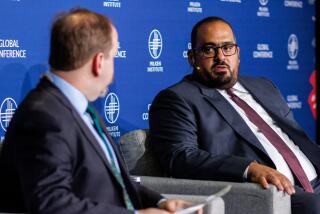A UCLA Technocrat in King Fahd’s Game
- Share via
The firing of Ahmed Zaki Yamani as Saudi Arabia’s oil minister and the replacement of him with Hisham Nazer signals a definite shift in Saudi policy--on both pricing and production. The effect on world energy supplies is problematical, although for the immediate future oil prices will continue to be highly volatile.
Oil policy is set by King Fahd and the ruling family--a fact underscored by the abrupt dismissal of Yamani--and the differences between Yamani and Nazer indicate that the rulers now want to try Nazer’s approach to bring higher oil prices and stability to the market.
Nazer is recognized as one of the ablest technocrats in Saudi Arabia. As the minister of planning, the UCLA graduate has been responsible for the development of the kingdom’s massive infrastructure as well as its petrochemical industry. He was a deputy to Abdullah Turaiki, whom Yamani succeeded as oil minister in 1962.
Nazer’s philosophy has been characterized by some as more nationalistic than Yamani’s. Rather than concentrating on the world energy picture, he has been more concerned about the immediate effect of oil production and policy on Saudi Arabia. Yamani, on the other hand, has taken the longer-range view that the kingdom should have a major responsibility in maintaining a stable, orderly world market so as not to undercut the value of Saudi Arabia’s vast reserves for the next 100 years.
Many were surprised when Yamani, a relatively unknown young lawyer, was selected by the late King Faisal in 1962 to succeed Abdullah Turaiki, who had been one of the moving forces behind the formation of the Organization of Petroleum Exporting Countries.
Subsequent events proved the wisdom of that choice. A man with a warm, outgoing personality and keen intellect, Yamani soon became the acknowledged leader of OPEC as Faisal delegated to him full responsibility and authority to act for the kingdom.
During Yamani’s tenure there were sweeping changes. They included the nationalization of exploration and production facilities, thereby giving the kingdom absolute control of its oil resources; the development of OPEC into a highly sophisticated cartel with absolute control--for a time--of oil prices, an event that rocked the world economies for more than a decade; an increase in price from less than $2 a barrel to a high of more than $34, which resulted in the greatest transfer of wealth in a short period in the history of the world, and the evolution of oil into a potent political as well as economic force.
Throughout all of these revolutionary events, Yamani was a moderating influence, although he frequently did not get such credit in the Western press.
His approach to the world energy market was summarized in the speech that he gave in September at Harvard University’s 350th anniversary celebration:
”. . . Saudi Arabia believes that oil is a special commodity whose availability to the free world should be ensured without disruption. Its price should, therefore, be set at a level that fulfills this objective. Understating or overstating that price level could lead to short-term or even long-term supply disruptions.”
Yamani believed that his policy was necessary to preserve the value of the Saudis’ vast oil reserves for future generations. His conviction is supported by the conclusions of the OPEC Strategy Planning Committee, which was established in the late 1970s. The committee included economic and petroleum experts from many areas and institutions, including Harvard. This committee’s computer model indicated that when the price of oil was raised above a certain level (approximately $30 per barrel), two things occurred: oil usage declined dramatically and alternate sources of energy became economically feasible.
In a speech in early 1981, Yamani said: “. . . If we force Western countries to invest heavily in finding alternate sources of energy they will. This would take no more than seven to 10 years and would result in reducing dependence on oil as a source of energy to a point which will jeopardize Saudi Arabia’s interests. Saudi Arabia will then be unable to find markets to sell enough oil to meet its financial requirements.”
Only time will tell whose policy--Yamani’s or Nazer’s--will prove to be correct. In his new position Nazer faces an immediate and some say impossible task. To ensure the Saudis’ goal of achieving an immediate $18 a barrel price, OPEC must not only retain or reduce quotas but it must also eliminate the widespread cheating that has wrecked previous agreements. Given the political differences of cartel members, few believe that Nazer can succeed where Yamani has failed. He is somewhat like the new quarterback sent in the last quarter to throw “the bomb” that will salvage the game. If he succeeds, he’ll be a hero. If not, there is always the Yamani strategy that can be tried again.
More to Read
Sign up for Essential California
The most important California stories and recommendations in your inbox every morning.
You may occasionally receive promotional content from the Los Angeles Times.










